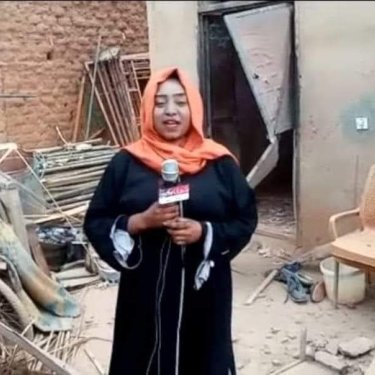Those who killed woman journalist in Sudan must be held to account

No investigation has yet been opened into the death of a Sudanese woman journalist who was run down by a vehicle of the paramilitary Rapid Support Forces 20 days ago, on 10 October. Reporters Without Borders (RSF) calls the Sudanese authorities to identify the persons responsible and bring them to justice.
The journalist, Halima Idris Salim, was covering fighting between the regular army and the paramilitaries in Omdurman, a city on the opposite bank of the Nile from the capital Khartoum, when a Rapid Support Forces vehicle knocked her down and left her for dead. It is still hard to know whether she was deliberately killed, but colleagues say her persistence in covering events in Sudan in an independent manner annoyed powerful people.
Aged 30, Salim worked for Sudan Bokra, a privately-owned, pro-opposition TV channel, and was well known and respected within the media. She studied at the Sudan Academy forCommunication Sciences before beginning to work as a journalist a decade ago for the sports radio station Arriadia FM and later for Radio Fikra, a web radio.
"Halima Idris Salim carried out her duties as a journalist in a professional and independent manner, and her death has deprived Sudanese citizens of an important source of access to the right to independent reporting. A thorough investigation is needed into the circumstances of herdeath and, in particular the way the Rapid Support Forces vehicle that ran her down immediately fled the scene. We call on the Sudanese authorities to do everything possible to ensure that those responsible for her death are identified and brought to justice. We also urge all parties to the conflict to guarantee journalists’ safety.
The Sudanese Journalists Network (SJN) issued a statement saying Salim was “killed in the course of carrying out her professional duties” and that she was “an example of a professional media personality who was committed to the issues of her country and its people.” The SJN also accused the parties to the conflict in Sudan of “systematically targeting journalists and media workers who strive to convey the facts to the Sudanese people and the world.”
The failure to launch any investigation into Salim’s death was denounced by a fellow woman journalist who asked not to be identified for fear of reprisals. She said the Sudanese authorities have been making no effort to investigate any of the attacks and abuses against journalists. The Sudan National Union of Journalists and many other journalists have also condemned the impunity for violence against media personnel.
Unable to flee the capital
RSF has learned that around 30 Sudanese journalists are currently unable to flee the extreme levels of danger in Khartoum, which include physical attacks, confiscation of equipment, arbitrary arrests and deliberate airstrikes on convoys of identifiable journalists. The threats to reporters have grown steadily in Sudan since April, when fighting broke out between the regular armed forces led by Gen. Abdel Fattah al-Burhan and the paramilitary Rapid Support Forces led by Gen. Mohamed Hamdan Daglo, who is also known as “Hemetti.”
Because of the dangers and their inability to work, many journalists have fled the region where they were based or even the entire country. Since the start of the conflict, RSF’s assistance desk has helped around 40 of them to flee to Egypt for safety reasons. But some have found themselves trapped in border areas. They include Mawahib Ibrahim, a member of the executive office of the Sudanese Journalists Union, whose visa requests for Saudi Arabia and Egypt were rejected without any justification.
